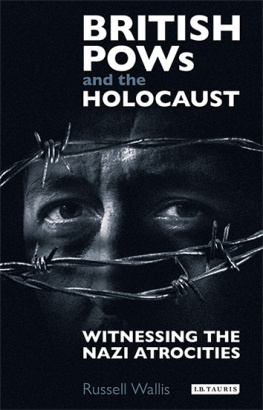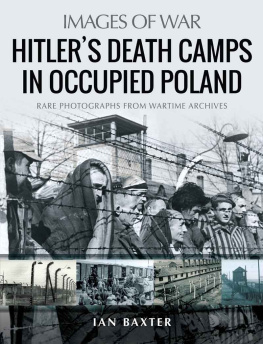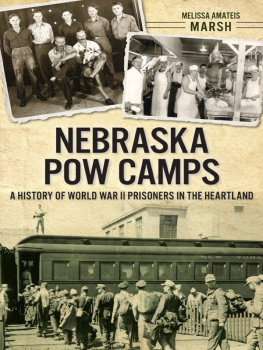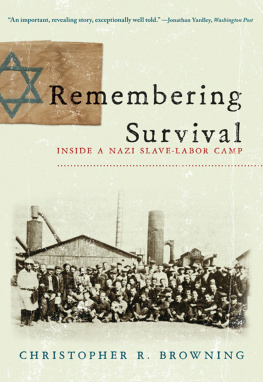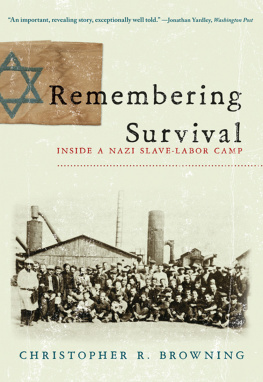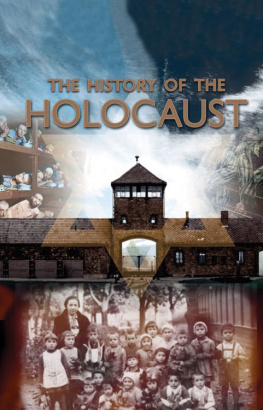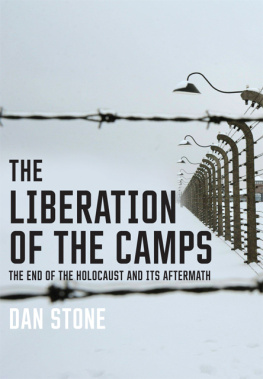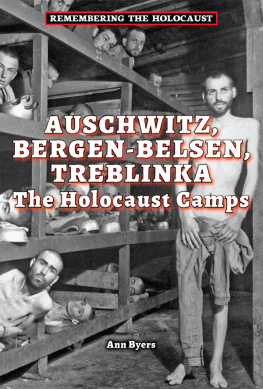Russell Wallis is an independent historian. Prior to this he was a research fellow at the Holocaust Research Centre at Royal Holloway. He is the author of Britain, Germany and the Road to the Holocaust (2014), also published by I.B.Tauris.
This meticulously researched book uncovers a story that has taken too long to be told. Wallis reveals that British POWs were uniquely placed to see for themselves the unprecedented crimes committed against Jews by Germans. Using eye-witness testimony, he reveals that conventional notions of courage and gallantry, fear and timidity cannot explain the actions and reactions of POWs who witnessed the greatest of crimes. This was previously merely a footnote to Holocaust scholarship; Wallis, therefore, opens up a whole new vista on the tragedy, which he relates in a moving, accessible and compelling way that will spark interest beyond academia.
Sarah J. Butler, Honorary Research Fellow, Royal Holloway, University of London
BRITISH POWS
AND THE
HOLOCAUST
Witnessing the Nazi Atrocities
R USSELL W ALLIS
For Professor David Cesarani
Published in 2017 by
I.B.Tauris & Co. Ltd
London New York
www.ibtauris.com
Copyright 2017 Russell Wallis
The right of Russell Wallis to be identified as the author of this work has been asserted by the author in accordance with the Copyright, Designs and Patents Act 1988.
All rights reserved. Except for brief quotations in a review, this book, or any part thereof, may not be reproduced, stored in or introduced into a retrieval system, or transmitted, in any form or by any means, electronic, mechanical, photocopying, recording or otherwise, without the prior written permission of the publisher.
References to websites were correct at the time of writing.
International Library of Twentieth Century History 97
ISBN: 978 1 78453 503 2
eISBN: 978 1 78672 194 5
ePDF: 978 1 78673 194 4
A full CIP record for this book is available from the British Library
A full CIP record is available from the Library of Congress
Library of Congress Catalog Card Number: available
ACKNOWLEDGMENTS
I would like to thank all of those who have made this study possible. The Holocaust Educational Trust commissioned me to undertake the research and I would particularly like to thank Martin Winstone, Alex Maws and Karen Pollock for their help and support. Also thanks to Martin Bright, who brought this story to the attention of the HET. I would like to place on record my gratitude to the staff of the Imperial War Museum Collections department, who were always gracious and helpful. My thanks also go to Dr Sarah Butler for combing through the manuscript in fine detail and providing many suggestions, all of which helped improve the work. Amy Hopwood MA was kind enough to plough through the manuscript and provide me with invaluable feedback. Finally, I am, of course, indebted to the late, great Professor David Cesarani, who was both catalyst and inspiration.
INTRODUCTION
Background
By the end of June 1942 the global prestige of the British Army had reached its lowest ebb. Not only was this a serious drain on Allied resources, it left those in enemy hands facing months and years of depravation, boredom and hardship.
They were held all over Germany and the occupied lands, spending their war in and around towns and villages with names now long forgotten except in local lore. But in many of these out-of-the-way places, another event was playing itself out. Supposedly shrouded in secrecy, the Jews of Europe were being stigmatised, marginalised, starved, worked to death, shot or eventually gassed. It is widely assumed that British POWs saw little of this, with only a handful witnessing anything at all. In fact, captured Britons saw and understood a great deal more than anyone has so far realised, yet their story remains largely untold. Despite the exponential growth of Holocaust scholarship since the 1980s, POWs and their interaction with the persecution and murder of European Jews has never been the subject of a comprehensive study. They have existed at the margins of a growing discipline, warranting little more than sensationalist memoir or journalistic excursion.
Although in the eyes of their captors POWs and Jews were obviously two very distinct groups, their paths often crossed. German authorities were always organising and reorganising, moving slave labourers in order to meet challenges caused by the shifting fortunes of war. To an extent the same was true of POWs, who were also moved around, especially during the latter stages of the conflict. POWs saw terrible things and word spread. The very nature of POW camp life, the long days and the incessant boredom, made men hungry for information, so news travelled fast. Fresh arrivals, transferees, returnees and escapees were all plugged for information. Gilbert Horobin, captured in Crete and then transported to former Polish territory, wrote that prisoners were eager to welcome newcomers a choice aperitif to our familiar diet of speculation and gossip. This intense desire for information informed a lively chatter culture that pervaded the POW population. The latest information about atrocities of all kinds set the wires humming. It was devoured, told and then re-told, cutting through the Nazi regime's desire for secrecy. However, British detainees did not just hear about the violence at the heart of Nazism, they also saw it with their own eyes; after all, they were present when Jews were transported, humiliated, starved, brutalised and murdered. Moreover, evidence suggests that they were also fully cognisant that Jews held a particular place in the Nazi mind. They broadly understood that Jewish people were the primary focus of Nazi rage for no other reason than they were Jews.
It is a common conception that British POWs reacted to Jewish suffering with compassion, humanitarianism or heroism, a view that has been largely dictated by a series of ghost written memoirs. These have held sway in the popular imagination partly because historians have either shown scant interest or reacted to these publications with a sense of indulgence and credulity that would rarely be afforded to other aspects of Holocaust historiography. Two memoirs in particular exerted a heavy influence on this comforting image of British valour, namely those of Charles Coward and more recently Denis Avey. This book will show that such an unqualified conclusion is, frankly, unfeasible.
In order to construct an accurate picture of the ways in which British POWs reacted to the Holocaust it is necessary, first, to build a context in which to situate their accounts. Contemporary POW accounts only make sense when placed in an appropriate framework and lack of both general and specific context is a glaring weakness in the existent literature on the subject. Its absence, along with reticence to engage critically with the subject, has allowed myths to emerge and to take root. If allowed to go unchecked, these will facilitate not only a false view of the experience of British POWs, but also of the Holocaust itself, thus providing (unintended) sustenance to odious pseudo-theories espoused by Holocaust deniers. From the outset, therefore, it seems necessary to state that the quest for historical accuracy will be important for this survey. This statement is perhaps more controversial than it sounds, after all, some keen intellects have questioned whether historical accuracy is a realistic aim and have even denied the possibility of objective knowledge about the past. This book will oppose that view by building a textured background and applying due diligence to the interpretation of available sources. Accounts written nearest in time to the events they describe, providing they are consistent with the historical record, will be given precedence on the basis that they are less susceptible to the vagaries of memory and the distortion that can be created by obeisance to market forces and cultural fashions. Those written later will be properly scrutinised for consistency with the earlier sources. All sources will be situated within a well-developed Holocaust historiography.

